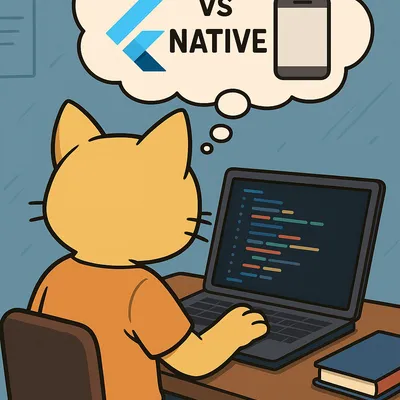Flutter vs. Native App Development: A Beginner's Guide
Flutter vs. Native App Development: A Beginner's Guide
Stuck choosing between Flutter and Native development? This guide clearly compares the pros and cons to help you find the perfect platform for your next project.

flutter vs native
Prologue: My First App, 'Suldduk'
I recently released an app I developed with Flutter, 'Suldduk - the Sobriety Helper,' on the Google Play Store.
At first, I chose to develop with Flutter to release on both Android and iOS. I briefly wondered if it would have been better to just develop with Android Studio, since my main language is Java and I was only planning to release on the Play Store. However, a comment on my Reddit post asking if I was going to release an iOS version made me realize that developing with Flutter was the right choice after all.
The app release process is tough on both the Play Store and the App Store, but I really hope my quitting alcohol helper app, Suldduk, gets a lot of love.
Part 1: What’s the Difference Between Flutter and Native?
The differences between Flutter and Native development are clear.
Flutter is a cross-platform framework, which means you can develop once and build for both Android and iOS. Of course, you’ll still need a Mac to build for iOS!
Native development requires you to use the specific language and development environment for each OS, meaning you have to develop separately. For Android, you'll use Java or Kotlin, and for iOS, you'll use Swift or Objective-C. In short, it's like making two separate apps.
However, since you're developing separately, Native apps can pull in new OS features and hardware performance most quickly and efficiently. This is why apps that require the highest level of performance still stick to the Native approach.
Part 2: Flutter vs. Native, An In-Depth Comparison
Flutter's Pros
- You can quickly develop for Android and iOS at the same time.
- It’s a widget-based approach, which makes for a beautiful UI.
- It has a wide range of libraries.
Flutter's Cons
- If you have a low-performance Mac, you may have to constantly switch between your Windows desktop and Mac to build.
- The development environment can be more limited compared to Native.
Native's Pros
- Top Performance: Because Native apps use the OS's own widgets, they are superior in terms of performance and optimization. This is a huge advantage for high-performance games or complex 3D graphics.
- Full OS Feature Access: Native development gives you full and immediate access to the latest OS APIs and features. For example, a new Face ID feature would be available to Native developers first.
- Rich and Stable Resources: The Android and iOS ecosystems have been around for a long time, so their official documentation and community resources are vast and stable.
Native's Cons
- Slow Development Speed: You have to develop the same app for Android and iOS separately. This obviously doubles the development time and cost.
- Complex Management: You have to manage two separate codebases, making it a hassle to fix bugs or add features to both platforms.
- High Learning Curve: The development languages and environments for Android (Kotlin/Java) and iOS (Swift/Objective-C) are different, so it takes a lot of time and effort to learn both.
Conclusion: So, Why Did I Choose Flutter?
First, since Dart was a new language for me, there was a learning curve. But it wasn’t that difficult. Of course, I did think it would have been nice if the rendering was similar to JavaScript. I could have used React Native, but I chose to invest in Flutter's future.
If you are a developer wondering what language to use for your app, I think you need to come up with a strategy.
- If you only want to release on one store -> Native app
- If you need an app with high performance (e.g., games where graphics and latency are important) -> Native app
- If you want to quickly develop an app to test the market reaction -> Flutter
- If you don't need a lot of complex features -> Flutter
A programming language is just a tool for building an app. But there are many tools available, so I think it's important to choose the one that's right for you!
Before I end my post, if anyone wants to quit drinking with the app I developed, please check out my landing page!